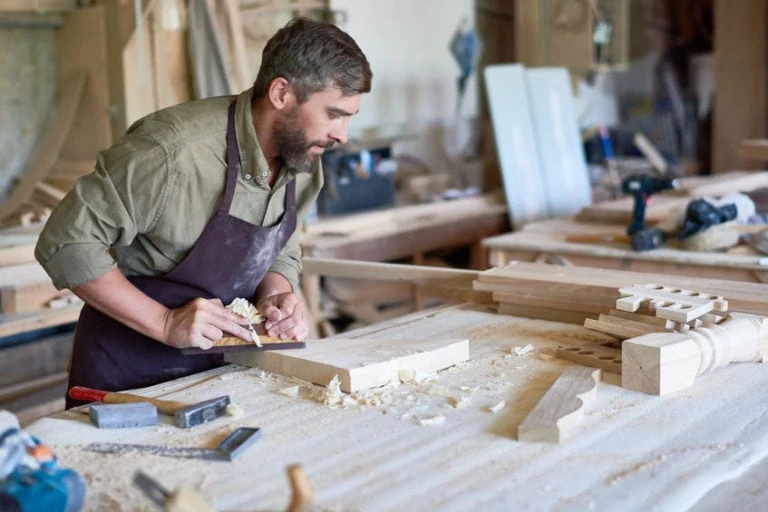Looking to get “back to basics” with woodworking and furniture making? Then ask the experts what they’d take with them if stranded in a rainforest with just three tools: The similarity in answers gives good guidance to all woodworkers.
“Since there would be no electricity, I’d take a pole lathe (which is run by foot power), an ax and a one-man, crosscut saw,” says expert woodworker Ernie Conover. “With these items I could fell timber and reduce it to sizes I could turn in the lathe to create pieces that are both beautiful and useful.”
Chair caning expert Lloyd Williams has similar thoughts. “A one-man, crosscut saw is essential to fell the trees and create workable planks,” says Williams, a furniture maker for the past 40 years. “Then, I’d want an old-fashioned brace & bit to bore assembly holes or make mortise. And, I’d need an 8-inch, double-cut Bastard file to dress them. With those tools I could be happy in that rainforest for a long time.”
Conover, who operates the Conover Workshops in Parkman, Ohio, has been making furniture for more than 30 years. He deals with furniture design, teaching and commissioned pieces on a daily basis and offers these tips for furniture-making Extreme How-To’ers considering going into the business:
- Don’t underestimate your value. Set a good hourly rate and don’t be afraid to charge for your skills and services.
- Whatever estimate of time you think up for a project, recognize that it will take more. Double your estimate.
- Before going into business, know that it’s about more than the wood. Marketing skills are essential and must be employed on a daily basis to promote your woodworking products and services.
- Consider this: Do you want to ruin a perfectly good hobby? You will have to make compromises in the name of economics that you may find hard to swallow. Be certain not to turn something you love into drudgery.
Conover, offers the following insight for furniture makers with a little more experience:
- Network all you can. Attend workshops, symposiums and demonstrations.
- Inspect other craftsmen’s work and learn from them.
- Protect your secrets. Keep proprietary information on your process, supply sources and other competitive advantages close to your heart.
- Never pass up the chance to advertise. Whether it’s helping Boy Scouts build birdhouses or talking to a local ladies club, take advantage of all opportunities to build your reputation.
- Keep an updated portfolio available at all times.
Additional furniture-making tips come from chair caner Williams:
- Invest in good quality tools. Bargain-priced tools are not necessarily bargains.
- Use only power tools with needle or ball bearings.
- Practice safety techniques at all times.
- Respect your tools by maintaining them. Take a course at a Woodcraft store on tool sharpening, maintenance and handling. This is a great investment.
- Cutting with dull blades gives you an uneven line.
- Ask questions from the right people and train with the best. Stay away from big-box stores and concentrate on woodworking stores.
- Rely on experience. Select web sites, woodworking stores, etc. from those with years of experience.
- Use the 1-800 number of woodworking stores and tool companies when you have questions about their products – these folks are the experts.
Looking for more advice? Williams recommends selecting pieces of mahogany for easy furniture working. Alder is his second choice because it is not available everywhere, so its reception by customers is high. Conover prefers the rich hardwoods available in northeastern Ohio. “As an artist I love turning a cornucopia of maple, beech, cherry, walnut, oak and poplar into fine furniture,” says Williams. “Working with figured woods – including curly and blistered maple, curly cherry and blistered poplar – is exceptionally rewarding.
For more information on Ernie Conover’s store, facility and classes, visit www.conoverworkshops.com.
Editor’s Note: This article was provided by Woodcraft. Visit www.woodcraft.com



